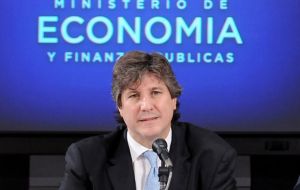MercoPress. South Atlantic News Agency
Argentina drastically limits the purchase of ‘cheap dollars’ fuelled by inflation
 Economy minister Boudou says the measures are aimed to discovering the origin of the funds
Economy minister Boudou says the measures are aimed to discovering the origin of the funds Argentine Vice-president elect and Economy Minister Amado Boudou reiterated Monday that the new rules for foreign currency purchase in effect as of today are aimed towards discovering the “origin” of funds as opposed to the “destination” of the money.
Boudou remarked everything is “in order” and assured buyers are to remain “unconcerned.”
“New rules take same time as a credit card approval for an ordinary sale,” said the minister. “We’ve been working to fight money laundering, which has to do with battling the informal economy, the black market, and this is a measure in that sense,” Boudou stressed.
However some Argentine members of Congress and economists insist the new dollar rules implemented by the AFIP tax revenue agency will only increase the appetite for the US dollar among the population.
“What (these measures) certainly achieve is an increase in desire” for the US currency, Deputy Alfonso Prat Gay, a former Central Bank head who is now part of the opposition centre-left Civic Coalition, said.
What the government needs to do to combat capital flight, is “a strong and significant battle” against inflation, which is “the deeper problem” leading to the tightening of the foreign-exchange market.
The deputy added that the government “is ignoring” the rise in consumer prices “maybe due to a moral question, because it has been hiding and denying it for so long ... it can’t attack the deeper problem, but rather just the superficial issue, and it also does that badly.”
The economist Luis Palma Cané agreed, noting that the way to solve capital flight “is to attack the essential problems in the Argentine economy,” particularly “a very cheap dollar” and consumer prices.
He went on to explain that “rather than save in Pesos, people obviously choose the dollar” due to the inflation rate, and noted that the new controls are “absolutely pointless” since “the only thing that you achieve is to increase the informal market”.
For his part, Aldo Pignanelli, a former Central Bank governor, said that these measures “are necessary but not sufficient” and the additional controls can only work during a transition period before applying more stringent controls.
“Surely we now have to wait for new decisions,” Pignanelli said before warning that “if some of the macroeconomic numbers don’t change, such as the high inflation rate and large money supply, tied with subsidies, it will be difficult to put the brakes on the dollar.”
While the latest measures change rules for companies and could increase the flow of greenbacks in the short-term, analysts say it risks putting off investors from doing business in Argentina.
Pignanelli agreed with others that “people buy dollars because it’s cheap” and forecast that “despite the historic electoral victory for the government, we’re heading toward a new capital flight record, beating what we saw in 2008,” when citizens were pushed toward the safety of the dollar due to the months-long conflict with the rural sector as well as the nationalization of the AFJP private pensions system.
Under the new US dollars purchase control the AFIP tax revenue agency is in charge of authorizing all such operations after the Foreign-Exchange Consultation Program was established by the AFIP and announced late Friday night by Economy Minister Amado Boudou.
All sales of foreign currency through ATMs, Internet banking and phone banking will be suspended until further notice, the Argentine Banks Association (ABA) said, noting they will not be able to apply the new regulations in time.
Banks and foreign-exchange houses will have to clear all transactions with the AFIP, and will also have to check and register every operation with an online system, regardless of whether the person who seeks the foreign currency is an individual or a corporation.
This new measure is implemented following a week in which controls intensified over the purchase of foreign currency, and inspectors from the AFIP, the Central Bank, the CNV securities regulator and the Financial Information Unit (UIF) descended on banks and foreign-exchange houses in downtown Buenos Aires to boost controls at a time when capital flight is soaring.
According to private estimates based on official data capital flight in Argentina during the last five years is estimated at 73 billion dollars.




Top Comments
Disclaimer & comment rules-

-

-

Read all commentsThe events at hand seem to be indicating an upcoming devaluation of the peso. Buying dollars (legally or illegally) makes sense. Moving assets outside the country also make sense. CFK is printing pesos to pay for her vote buying. Act accordingly.
Oct 31st, 2011 - 07:53 pm 0I didnt know you were such an economic genius wesley?Maybe you might tell Osborne how to get the English economy growing even though he has the printers on overdrive
Oct 31st, 2011 - 07:59 pm 0Default is the best option for Britain. Similarly for the US. Argentina is hopeless. The fact that people are buying dollars in Argentina suggests that they sense an upcoming devaluation also. Its not like its never happened before in Argentina (more devaluations than Madonna has had lovers). You can be sure that Mr Boudou has his money outside the country in dollars or Swiss francs.
Oct 31st, 2011 - 08:37 pm 0Commenting for this story is now closed.
If you have a Facebook account, become a fan and comment on our Facebook Page!